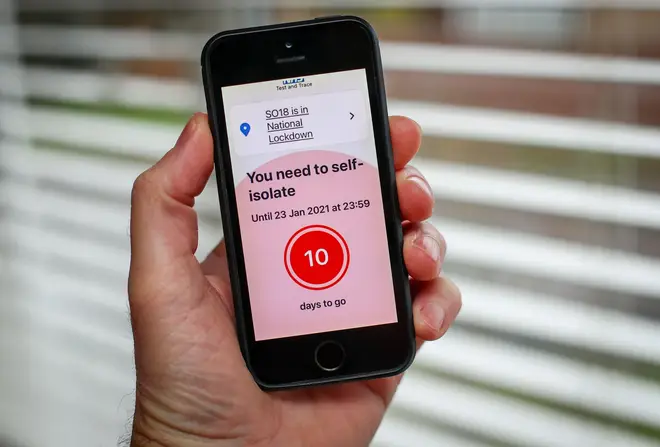
Nick Ferrari 7am - 10am
16 July 2021, 06:59 | Updated: 16 July 2021, 07:11

Do you need to self-isolate if you get pinged by the NHS Covid app?
There's been a lot in the news about people deleting the NHS apps on their phones to avoid being pinged and required to self-isolate.
And just today we learn the NHS Covid app sent half a million alerts to users in the most recent week.
We're hearing that huge numbers of people are being pinged - many just because they happen to have been in the same train carriage, or in a shop, with someone who has later tested positive for Covid - and the government is thinking about dialling down the sensitivity of the app at some point next month.
Read more: NHS Covid app sends half a million alerts in a week amid staff shortage fears
But the requirement to self-isolate if pinged by the NHS Covid app is not law.
It’s government guidance.
There’s an important difference between the two.
In the context of most Covid laws, if you breach them, you can be fined. But with guidance, although it’s recommended that people it, there's no legal penalty if you choose not to.
So, if you're pinged by the app, there is no legal obligation to self-isolate.
Government guidance encourages you to do so. But there is no criminal offence committed if you don't.
The relevant law is regulation 2 of The Health Protection (Coronavirus, Restrictions) (Self-Isolation) (England) Regulations 2020.
That makes it clear the requirement to self-isolate applies if you've been notified that you, or a close contact, have tested positive - but not if the notification was a ping from the app.

NHS Covid App: Why you DON'T have to isolate after a ping
A lot of people don't want to pinged, so are deleting the app. But that's because of the wrong assumption that you have to self-isolate if you get pinged. That assumption is wrong.
Keeping the app gives you options; it gives you the option to self-isolate. It gives you the option to take lateral flow tests every day; it gives you the option to eliminate non-necessary activities.
It doesn't put you at risk of criminal penalty, or a fine, if you don't self-isolate.
Having said that, guidance is there for a reason, and it should be followed in the interests of public health.